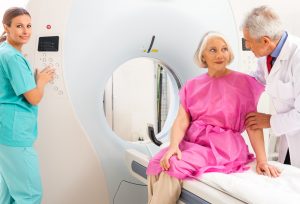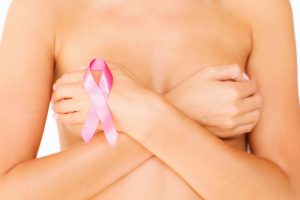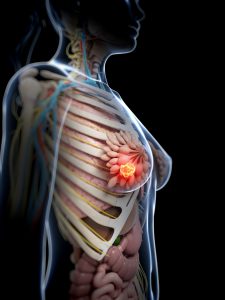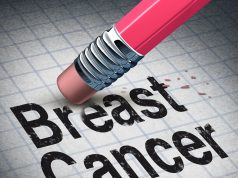 A new, simple test could soon be all it takes for women with the deadliest form of breast cancer to determine their response to treatment. “Triple-negative” breast cancer is an aggressive type of the disease that is known to survive chemotherapy. More than 1/3 of all women undergo standard chemotherapy only to see the disease return within three years. The new test could allow doctors to identify these women ahead of time so that they can treat them with an alternative chemotherapy that is more likely to be effective.
A new, simple test could soon be all it takes for women with the deadliest form of breast cancer to determine their response to treatment. “Triple-negative” breast cancer is an aggressive type of the disease that is known to survive chemotherapy. More than 1/3 of all women undergo standard chemotherapy only to see the disease return within three years. The new test could allow doctors to identify these women ahead of time so that they can treat them with an alternative chemotherapy that is more likely to be effective.
The test is a simple biopsy of breast tissue that looks for a protein called NUP98, and the results are available within 24 hours. According to researchers who studied more than 500 women with the disease, the protein NUP98 switches on genes that help cancer cells survive chemotherapy. Therefore, women with high levels of the protein are ten times more likely to see their cancer return. This in turn raises their risk of dying from the disease, and they are half as likely to benefit from the standard chemotherapy
The test is said to be available for women within the next ten years, but some patients will be able to enter clinical trials in the next five years.
“We know that triple-negative breast cancer is a very aggressive form of the disease,” said Dr. Niamh Buckley, who led the study from Queen’s University Belfast. “This test will hopefully help us to identify women who should be given an alternative form of chemotherapy and could stop breast cancer coming back in these women, saving their lives.”
 Approximately one in seven breast cancers are triple-negative, which means that they are negative for “receptors” on cancer cells, which receive signals to divide. In other types of breast cancer, such as “oestrogen receptor-positive,” the disease can be treated with wonder drugs like tamoxifen. However, women with triple-negative breast cancer do not have that option, which makes surgery and chemotherapy their only chance of survival.
Approximately one in seven breast cancers are triple-negative, which means that they are negative for “receptors” on cancer cells, which receive signals to divide. In other types of breast cancer, such as “oestrogen receptor-positive,” the disease can be treated with wonder drugs like tamoxifen. However, women with triple-negative breast cancer do not have that option, which makes surgery and chemotherapy their only chance of survival.
This new test, revealed in the journal BMC Cancer, could help as many as one out of every three women for whom the normal standard chemotherapy won’t work. It’s able to distinguish women with high levels of the protein NUP98, which sets them apart from the other two thirds of patients with the same type of cancer. Although it is not fully understood how exactly the protein works, researchers believe that it may switch on genes which repair the DNA damage or help cancer cells survive it by blocking the signal that kills them when they are damaged.
Once the test is implemented, women with this unique protein make-up can be given a treatment that is more likely to work for them and stop the cancer from either coming back or metastasizing to the liver or brain. One type of this alternate chemotherapy is a drug called “taxanes” which is used to stop cancer cells from dividing.

The team used breast tissue samples from over 100 women with triple-negative breast cancer and confirmed results with an additional database of 450 patients who used a substance that reacts with NUP98. The protein is tagged with a brown dye in the breast tissue sample so that it can be easily identified in the laboratory. Women with high levels of the protein NUP98 are seven to ten times more likely to see their breast cancer come back after chemotherapy.
Baroness Delyth Morgan, chief executive of Breast Cancer Now, which funded the study, said: “This is a very promising discovery. It’s really encouraging that testing for levels of NUP98 could help ensure patients get the type of chemotherapy that’s most likely to be effective for them as early as possible.”




























